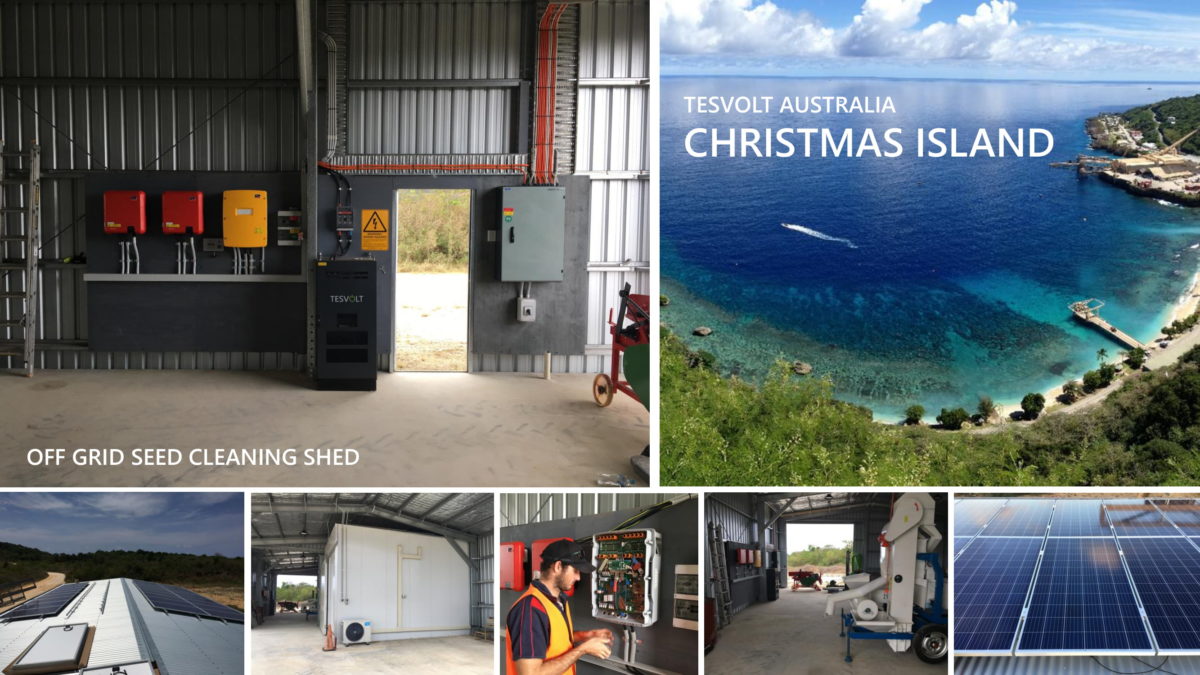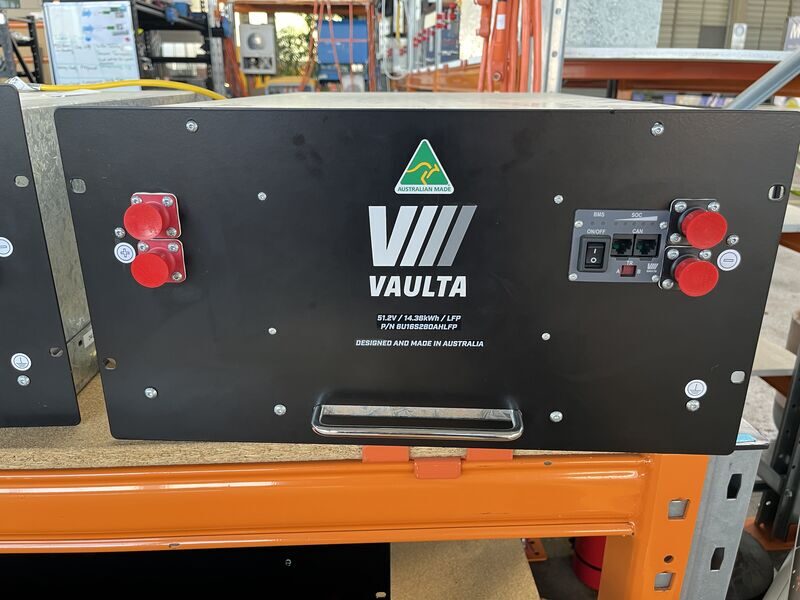With a picturesque national park occupying most of its territory, home to many animal and plant species including a prodigious population of red crabs, Christmas Island is also known for intensive phosphate mining and severe ecological stress it brings.
A few years ago, a research project has been launched to transform former mining sites into agricultural land using a facility, which is today powered by solar+storage.
The seed cleaning shed features a 11,7 kW rooftop solar installation (36 pcs. Trina Solar 325W TallMax (72 cell) solar modules), SMA Sunny Boys inverters 2x5kW, SMA Sunny Island 8 battery inverter (6kW) and a 14.4kWh battery system – Tesvolt TS 25 (48V).
The off-grid system was commissioned in September 2018 and was designed to run the cool room for 24 hours and provide surplus energy for power tools, seed processing machines and lighting.
The results in terms of operational cost savings have been astounding. While the levelized cost of energy (LCOE) of a diesel generator, including the fuel shipping costs, stood between 66-86 $cent/kWh, the LCOE of solar+storage amounted to 16 $cent/kWh.
Amid a growing growing number of island nations ditching diesel in favor of renewables, German battery storage manufacturer Tesvolt believes the savings achieved at the Christmas Island project are set to attract similar project owners to consider the renewable option in the region.
While it had limited options but to operate on diesel or using available renewable energy sources, the off-grid shed is part of a collaborative research project (MINTOPE) conducted by Murdoch University and Phosphate Resources, the owners of a phosphate mine on Christmas Island, and financially underpinned by the Australian Commonwealth Government.
Its goal is to assess the viability of rehabilitating ex-phosphate-mined lands to land suitable for agriculture, and thus create a new economic driver for the the Christmas Island population.
Off-grid uptake slower than expected
Commenting on the speed at which off-grid businesses and communities are adopting solar and storage as an alternative to diesel genset across Australia, George Zombori, CEO of Tesvolt Australia, says while this depends on the state, for e.g. South Australia should lead the way as it has most expensive electricity, the transition is generally not fast enough.
“As you know to implement a “new technology” takes time and we have seen several unreliable products flooding the market, being installed at remote sites which might have not met customer’s expectation,“ Zombori tells pv magazine Australia.
“Off-grid systems need high upfront capital investment and remote sites are sometimes less attractive for banks to finance. On top of that comes a limited number of “real” off grid experts/electricians with experience and a technology maze – too much options to choose from.“
One of Tesvolt’s notable projects is Australia is an off-grid Western Australian project, which was awarded the Smarter E award in Munich last year. Delivered in cooperation with Australian EPC Unlimited Energy, the off-grid system is powering a far-flung farm by the combination of a 53 kW solar PV installation, which feeds into a 160 kWh saltwater battery system from U.S. producer Aquion Energy and a 48 kWh lithium-ion battery from German manufacturer Tesvolt.
“Off-grid uptake is happening, but much slower than expected, in spite of the fast returns (2 years) and 75% savings,“ says Zombori.
He notes that policy uncertainty and a strong coal lobby in Australia are among the main challenges for renewables uptake, and hopes this will change after this year’s election. Globally, Zombori believes that the transition is already pretty fast in the solar PV field, adding that it will be a game changer once good batteries get affordable in the coming years.
This content is protected by copyright and may not be reused. If you want to cooperate with us and would like to reuse some of our content, please contact: editors@pv-magazine.com.









By submitting this form you agree to pv magazine using your data for the purposes of publishing your comment.
Your personal data will only be disclosed or otherwise transmitted to third parties for the purposes of spam filtering or if this is necessary for technical maintenance of the website. Any other transfer to third parties will not take place unless this is justified on the basis of applicable data protection regulations or if pv magazine is legally obliged to do so.
You may revoke this consent at any time with effect for the future, in which case your personal data will be deleted immediately. Otherwise, your data will be deleted if pv magazine has processed your request or the purpose of data storage is fulfilled.
Further information on data privacy can be found in our Data Protection Policy.